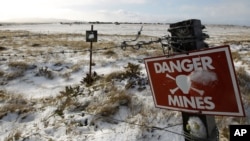GENEVA —
Campaigners for a mine-free world say they are closing in on their goal and are urging governments to commit to eradicating antipersonnel landmines in years, not decades.
At the opening of a week-long review of the 1997 Mine Ban Treaty at the United Nations headquarters in Geneva, more than 100 governments are expected to review progress in halting production, destroying stockpiles and clearing mines after wars.
Fifteen years after the Mine Ban Treaty was opened for signature in Ottawa in 1997, 160 countries — nearly 80 percent of the world's nations — have joined the treaty.
International Committee of the Red Cross (ICRC) President Peter Maurer says there is a need for renewed commitment by landmine states to extend the scope of the treaty and to implement its obligations through concrete action.
A recent report, the Landmine Monitor, finds the annual casualty rate from explosive remnants of war has decreased dramatically since the treaty came into force. But Maurer says the toll remains unacceptably high with 4,000 landmine victims last year.
“We are concerned as ICRC about the apparent lack of the urgency by a number of states to fulfill their clearance obligations today," he said. "Too many states, parties have fallen behind their clearance plans. Too many mine-affected communities continue to suffer from delays in mine clearance, which put their lives and limbs at risk and impede access to agricultural land.”
Campaigners note 19 states have declared their territories mine-free and four other countries — the Republic of Congo, Denmark, Jordan and Uganda — are expected to announce completion of mine clearance during this week’s assembly. They also say more than 46 million stockpiled mines have been destroyed under the treaty.
Nobel peace laureate Jody Williams, who was a founding coordinator of the International Campaign to Ban Landmines in 1992, echoed concerns of numerous campaigners who cite a decrease in financial support for victim assistance programs.
This year’s Landmine Monitor notes a 30-percent drop in money to aid landmine survivors, as, Williams said, most money goes toward mine clearance.
“I think it is because once you get the mine out of the ground and it is gone, the issue [perceived to be] completed," she said. "But a landmine survivor, his or her family, the communities living with the aftermath of landmine accidents, need help for decades to come.
"We would make the strong call for states to not reduce the amount of money to landmine survivors, but increase it, actually," she said.
Campaigners say serious concerns to be raised during the meeting include use of anti-personnel landmines by Syria in 2012. The Landmine Monitor finds Syria is currently the only government in the world to use landmines, down from four governments in 2011 — Israel, Libya, Burma and Syria.
The conference also will deal with concerns regarding the use of landmines by non-state armed groups in six countries: Afghanistan, Colombia, Burma, Pakistan, Thailand and Yemen.
They say it is time to finish the job to ensure landmines do not claim any more limbs and lives.










